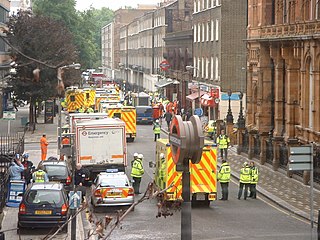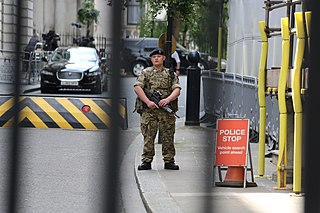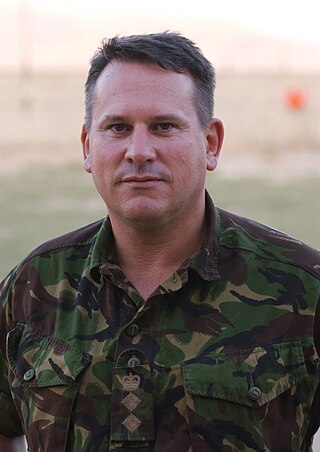Military career
On 11 April 1981, Black was commissioned into the Welsh Guards as a second lieutenant. [3] He commanded a platoon in the Falklands War of 1982, surviving the bombing of RFA Sir Galahad, [4] and was promoted lieutenant on 25 January 1984, [5] captain on 11 October 1987, [6] and major on 30 September 1991. [7] He had three tours of Northern Ireland, where one of his roles was as an intelligence officer in Republican West Belfast, and he also served with the British Army of the Rhine and the United Nations Peacekeeping Force in Cyprus. After attending the Staff College, Black specialised in intelligence. In the 1997 New Year Honours, he was appointed Member of the Order of the British Empire for his Defence Intelligence Staff work in connection with the break-up of Yugoslavia. [8] [9]
Black was promoted lieutenant colonel on 30 June 2000. [10] He was on intelligence duty on the night of 11–12 September 2001, and retired the service on 1 July 2002, [11] his last posting being a secondment to the Cabinet Office as an intelligence adviser to the Prime Minister, the Joint Intelligence Committee and COBR (Cabinet Office Briefing Room). [8]
In the early 1990s, he and his Welsh Guards were the subject of a BBC television documentary by Molly Dineen called In the Company of Men. [8] In the course of that, Black said that if John Birt (then Director-General of the BBC) had been a member of his regiment, he would have had him sacked, [12] and one commentator described him as the "suavely telegenic star" of the documentary. [13]

The Security Service, also known as MI5, is the United Kingdom's domestic counter-intelligence and security agency and is part of its intelligence machinery alongside the Secret Intelligence Service (MI6), Government Communications Headquarters (GCHQ), and Defence Intelligence (DI). MI5 is directed by the Joint Intelligence Committee (JIC), and the service is bound by the Security Service Act 1989. The service is directed to protect British parliamentary democracy and economic interests and to counter terrorism and espionage within the United Kingdom (UK).

General Sir Michael David Jackson, is a retired British Army officer and one of its most high-profile generals since the Second World War. Originally commissioned into the Intelligence Corps in 1963, he transferred to the Parachute Regiment in 1970, with which he served two of his three tours of duty in Northern Ireland. On his first, he was present as an adjutant at the events of the Ballymurphy massacre (1971), where eleven unarmed civilians were shot dead by British troops, and then at Bloody Sunday in 1972, when British soldiers opened fire on unarmed protesters, killing fourteen. On his second, he was a company commander in the aftermath of the Warrenpoint ambush (1979), the British Army's heaviest single loss of life during the Troubles. He was assigned to a staff post at the Ministry of Defence (MoD) in 1982 before assuming command of the 1st Battalion, Parachute Regiment, in 1984. Jackson was posted to Northern Ireland for the third time, as a brigade commander, in the early 1990s.

Elizabeth Lydia Manningham-Buller, Baroness Manningham-Buller, is a retired British intelligence officer. She worked as a teacher for three years before joining MI5, the British internal Security Service. She led the newly created Irish counter-terrorism section from 1992 and then became director in charge of surveillance and technical operations. She became Director General of MI5 in October 2002 and, in that capacity, led the Security Service's response to the 7 July 2005 London bombings. Following her retirement in April 2007, she became a crossbench life peer in 2008.

Alun Arthur Gwynne Jones, Baron Chalfont, was a British Army officer, a British politician and a historian.

The 7 July 2005 London bombings, also referred to as 7/7, were a series of four coordinated suicide attacks carried out by Islamist terrorists that targeted commuters travelling on London's public transport during the morning rush hour.

Jonathan Douglas Evans, Baron Evans of Weardale, is a British life peer who formerly served as the Director General of the British Security Service, the United Kingdom's domestic security and counter-intelligence service. He took over the role on the retirement of his predecessor Dame Eliza Manningham-Buller on 21 April 2007. Evans was succeeded by Andrew Parker on 22 April 2013.

The United Kingdom Terror Threat Levels, often referred to as UK Threat Levels, are the alert states that have been in use since 1 August 2006 by the British government to warn of forms of terrorist activity. In September 2010 the threat levels for Northern Ireland-related terrorism were also made available. In July 2019 changes were made to the terrorism threat level system, to reflect the threat posed by all forms of terrorism, irrespective of ideology. There is now a single national threat level describing the threat to the UK, which includes Islamist, Northern Ireland, left-wing and right-wing terrorism. Before 2006, a colour-based alert scheme known as BIKINI state was used. The response indicates how government departments and agencies and their staffs should react to each threat level.

Alan William John West, Baron West of Spithead, is a retired admiral of the Royal Navy and formerly, from June 2007 to May 2010, a Labour Parliamentary Under-Secretary of State at the British Home Office with responsibility for security and a security advisor to Prime Minister Gordon Brown. Prior to his ministerial appointment, he was First Sea Lord and Chief of the Naval Staff from 2002 to 2006.

General Sir Nicholas Ralph Parker, is a former British Army officer who served as Commander Land Forces until December 2012.
Rear Admiral Christopher Hugh Trevor Clayton, is a former Royal Navy officer who served as a Lynx helicopter pilot during the Falklands War. He went on to become a senior naval officer, commanding ships during the Hong Kong handover ceremony and 2003 invasion of Iraq and later serving high-level positions in NATO.

General Sir Peter Anthony Wall, is a retired British Army officer who served as the Chief of the General Staff, the professional head of the British Army, until September 2014. Wall had previously been the Commander-in-Chief, Land Forces from August 2009 to September 2010. He succeeded General Sir David Richards as Chief of the General Staff in September 2010, the latter going on a month later to be Chief of the Defence Staff.

Colonel Richard Justin Kemp is a retired British Army officer who served from 1977 to 2006. Kemp was an infantry battalion commanding officer. Among his assignments were the command of Operation Fingal in Afghanistan from July to November 2003. After retiring Kemp co-wrote Attack State Red with Chris Hughes, an account of the 2007 Afghanistan campaign undertaken by the Royal Anglian Regiment, documenting their initial deployment.

Lieutenant Colonel Rupert Stuart Michael Thorneloe, MBE was a British Army officer who was killed in action on 1 July 2009 near Lashkar Gah, Helmand Province in southern Afghanistan. Thorneloe is the highest-ranking British Army officer to have been killed in action since Lieutenant Colonel H. Jones's death in 1982 during the Falklands War.
Lieutenant General Sir Cedric Norman George Delves, is a retired British Army officer and a former commander of the 22nd Special Air Service Regiment.
Cecil Egerton Dixon was a Scottish first-class cricketer and an officer in the Intelligence Corps during the Second World War.
Peter John Michael Clarke, CVO, OBE, QPM is a retired senior police officer with London's Metropolitan Police most notably having served as a Deputy Assistant Commissioner with the Specialist Operations directorate, commanding the Counter Terrorism Command.

Lieutenant General Sir James Benjamin "Jim" Dutton, is a retired Royal Marines officer and former Governor of Gibraltar. He held various staff positions in his early career, before commanding 40 Commando. As a brigadier, he held two high-level staff posts—the first at the Ministry of Defence in London, as Director of NATO policy, and the second as a British liaison to The Pentagon shortly after the September 11 attacks, where he was involved in the planning for the subsequent invasion of Afghanistan.

Lieutenant General Sir John Gordon Lorimer, is a retired senior British Army officer, who served as the Chief of Joint Operations and the Defence Senior Adviser to the Middle East and North Africa. He was appointed Lieutenant Governor of the Isle of Man on 29 September 2021.
Andrew David Parker, Baron Parker of Minsmere,, is a British peer and former intelligence officer who served as Director General of MI5 from 2013 to 2020. He has served as Lord Chamberlain of the Household since 1 April 2021, and is a crossbench member of the House of Lords.

Sir Alexander William Younger is a British former intelligence officer who served as the Chief of the Secret Intelligence Service (MI6), from 2014 to 2020. In April 2019, the government extended Younger's contract to maintain stability through the Brexit negotiations, which made him the longest-serving MI6 chief in 50 years.














